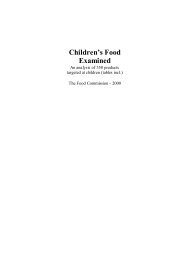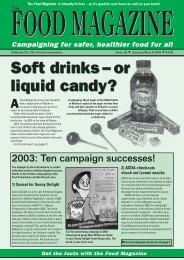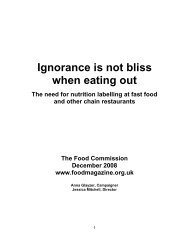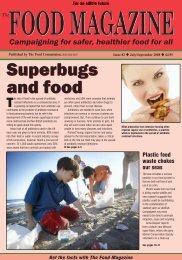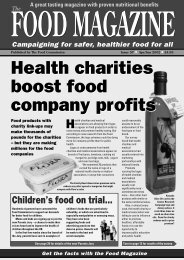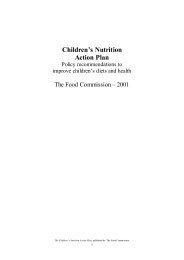Food Magazine - The Food Commission
Food Magazine - The Food Commission
Food Magazine - The Food Commission
You also want an ePaper? Increase the reach of your titles
YUMPU automatically turns print PDFs into web optimized ePapers that Google loves.
news<br />
<strong>Food</strong> <strong>Commission</strong> tells FSA: Don’t lose your nerve!<br />
In 2003, the <strong>Food</strong> Standards Agency (FSA)<br />
quietly issued a spreadsheet containing<br />
calculations of how each sector of food<br />
manufacturing could help UK adults to achieve<br />
the goal of consuming no more than 6g of salt<br />
per day. It was a mathematical representation of<br />
shared responsibility. It took account of<br />
reductions in table salt added by consumers. But<br />
it also apportioned salt reductions to every type<br />
of processed food. If every sector complied, so<br />
the argument went, then most people in the UK<br />
would generally eat a less salty diet, even when<br />
they choose ‘ordinary’ foods rather than<br />
explicitly ‘healthier’ options.<br />
Two years on, and the document is still in<br />
consultation. We are promised a finalised<br />
version within a few months. But the<br />
consultation process has already shown up big<br />
differences in responses from the food industry.<br />
This led the FSA to circulate a new spreadsheet<br />
with many relaxed salt levels. A column in the<br />
database explained the reason for the change in<br />
each case, frequently citing industry as having<br />
said the 2003 figures were ‘too hard to achieve’.<br />
In some cases, just one manufacturer saying<br />
they had achieved or beaten the target seemed<br />
to give the the FSA courage to stick to its guns.<br />
So we set out to find any examples we could<br />
of products that already meet or beat the targets.<br />
We looked at nine main food categories in nine<br />
of the leading supermarkets.<br />
We found that one or more supermarket had<br />
beaten the original salt target in every one of<br />
those nine everyday food categories.<br />
Peanuts get four reds<br />
So far, Sainsbury's is the only company we've<br />
seen who has taken the plunge and give clear<br />
nutritional information on the front of the pack,<br />
banded in green, orange and red for low, medium<br />
and high. <strong>The</strong> aim is to help people balance their<br />
intake of fat, salt, sugar and calories.<br />
Sainsbury's salted peanuts come out with<br />
four reds out of five (the only green 'low' is for<br />
added sugars). So what are the other<br />
companies nervous of Are Sainsbury's<br />
customers running from the peanut packets in<br />
fear Have sales of<br />
Sainsbury's peanuts<br />
collapsed All that is<br />
required is a small shift<br />
from fatty and salty items<br />
to healthier alternatives.<br />
We look forward to<br />
Sainsbury's sharing sales<br />
data. Perhaps that way,<br />
other companies can gain<br />
the confidence to provide<br />
customers with better<br />
information.<br />
We visited branches of ASDA, the Co-op,<br />
Iceland, M&S, Morrisons, Sainsbury’s,<br />
Somerfield, Tesco and Waitrose.<br />
For sausages, the FSA’s target remained<br />
unchanged at 0.55g of sodium per 100g. We<br />
found Co-op, M&S and Morrisons sausages all<br />
with a lower sodium level of 0.5g. Waitrose and<br />
the Co-op had done even better with their<br />
healthier versions – at 0.4 and 0.3g respectively.<br />
For white sliced bread, the FSA has<br />
suggested a weakened target, allowing 0.4g of<br />
sodium instead of 0.35g. We found that<br />
Morrisons had already beaten the original target,<br />
at 0.28g; Waitrose was close behind at 0.39g.<br />
For baked beans, the FSA has unusually<br />
reduced the desired level of sodium below the<br />
original 2003 figures, from<br />
3.5 to 3.0g sodium per<br />
100g. We found that<br />
ASDA, the Co-op,<br />
Sainsbury’s, Waitrose and<br />
Somerfield had all beaten<br />
the more stringent target<br />
– some achieving a level<br />
of as little as 0.2g.<br />
In tomato soup, ASDA<br />
and the Co-op had<br />
achieved a low 0.2g,<br />
beating the new 0.25g<br />
figure from the FSA. In<br />
cheese and tomato pizzas,<br />
ASDA, Iceland,<br />
Sainsbury’s,<br />
Tesco and<br />
Burger King snubs FSA on salt<br />
In an apparent snub to the <strong>Food</strong> Standards<br />
Agency (FSA) the fast food giant Burger King<br />
said at the beginning of October that it had no<br />
further plans to reduce levels of salt, fat or sugar<br />
in its products.<br />
Burger King, which uses the slogan 'Have it<br />
your way', dropped out of the voluntary<br />
agreement with the FSA, just 24 hours before the<br />
FSA launched the second stage of its £6 million<br />
campaign encouraging people to reduce salt.<br />
Yet within hours of receiving a thrashing in<br />
the media for appearing to renege on its previous<br />
commitment, the company was back with its tail<br />
between its legs, saying that it did indeed<br />
support the need to take action to reduce salt<br />
intake and that its ‘commitment to working in<br />
partnership with the FSA will continue’.<br />
<strong>The</strong> <strong>Food</strong> <strong>Commission</strong> and other campaign<br />
groups have previously warned that voluntary<br />
agreements with the food industry are vulnerable<br />
to the whim of a highly competitive marketplace.<br />
Many campaigners believe that legislation will be<br />
the only way to ensure that all companies face<br />
up to their responsibilities as food providers, and<br />
Waitrose had all at least met the old 0.3g target<br />
and beaten the new 0.4g target, despite the fact<br />
that the FSA reported that it had raised the level<br />
because ‘the industry has indicated that a target<br />
of 0.3g would not be achievable’.<br />
Similar patterns emerged in salt & vinegar<br />
crisps and tomato ketchup, with eight out of nine<br />
supermarkets already beating the new target,<br />
and Waitrose, Iceland and M&S also comfortably<br />
beating the previous lower target.<br />
We urge the FSA not to lose their<br />
nerve, to liaise with the food<br />
technologists who have achieved<br />
these changes, and to share<br />
learning with the laggards, for the<br />
benefit of all.<br />
Supermarket beans, sauces and soups - all beating the FSA salt targets<br />
not see progressive companies penalised by<br />
losing ground to their competitors.<br />
Rosemary Hignett, FSA head of nutrition, was<br />
quoted by the Sunday Times as being: ‘very<br />
disappointed’ by Burger King's initial decision.<br />
<strong>The</strong> <strong>Food</strong> <strong>Commission</strong> has analysed the<br />
declared sodium content of Burger King products<br />
(excluding desserts and drinks) and has found<br />
that the large majority (81 per cent) still contain<br />
a lot of salt according to FSA criteria (0.5g<br />
sodium or more per 100g). <strong>The</strong> only exceptions<br />
were onion rings (three sizes), some (not all)<br />
salads, medium hash browns, a Chicken Bites<br />
product and two children's products.<br />
A typical Burger King meal, a Double<br />
Whopper & Cheese with large fries gives 5.45g<br />
salt – almost the maximum recommended daily<br />
intake (6g) for an adult. This intake level has<br />
been set to be 'achievable' for the UK population<br />
as opposed to 'optimal for health'. Ideally we<br />
should consume less salt, but with current<br />
intakes typically 11g for men and 8g for women,<br />
a compromise figure of 6g per day was felt to be<br />
easier to achieve in the short term.



